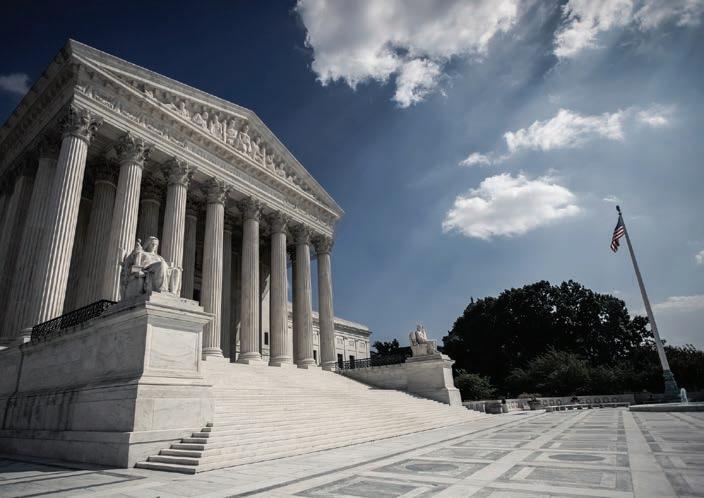
4 minute read
Last Word
The FCC Fights Back
The commission wants the “last word” in a debate with two U.S. Court of Appeals judges who have curbed ownership rules for 17 years. BY MEREDITH SENTER
The Federal Communications Commission (FCC) says it is “mad as hell, and it’s not going to take this anymore.” Well, maybe the commission hasn’t used those exact words, but it is certainly channeling Howard Beale from the movie Network.
The commission’s ire relates to a threejudge panel of the U.S. Court of Appeals for the Third Circuit, which hears cases arising in New Jersey, Pennsylvania and Delaware. It set aside the commission’s 2017 decision that loosened the broadcast ownership rules, as discussed in “Dear Expert” on page 6.
Making the situation even more grating: over the last 17 years, the same three judges have reviewed every attempt by the FCC to revise its broadcast ownership rules pursuant to the congressionally required review process. And two of the three have consistently thwarted the FCC’s ownership-relaxation efforts.
Here’s the backstory: In 2003, a public interest group known as the Prometheus Radio Project sought review of the FCC’s 2003 reevaluation of its ownership rules by filing an appeal in the U.S. Court of Appeals for the Third Circuit.
In 2004, two of the three judges set aside much of the FCC’s 2003 decision, telling the FCC that it needed to give the judges a better explanation of why the ownership rules should be relaxed.
It is not unusual for a U.S. Court of Appeals to set aside a rule adopted by a federal regulatory agency. But in this case, the decision was remarkable because the court said that it retained jurisdiction over the case, which meant that after the FCC reconsidered the rule change, the same three judges would consider any appeal.
Since that time, the composition of the FCC has changed three times, from the Bush to the Obama to the Trump administrations. In four instances the two judges from the Third Circuit have foiled the FCC’s attempts to modify its ownership rules. In each case, the same third judge dissented. In other words, two judges have effectively constituted themselves as an FCC ownership rule review court.
The court’s decisions appear to be based more upon the policy considerations the two judges believe are of paramount importance than upon whether the rules adopted by the FCC are unlawful. This is an important distinction because under the U.S. legal system, laws are enacted by Congress and agencies. Judges’ roles are generally limited to determining whether the laws were lawfully enacted and to interpreting them.
In this instance, the statute requiring the FCC to review its rules every four years directs the commission to consider current ownership rules and repeal or modify any that are no longer in the public interest as a result of competition. The two judges in the majority, however, have focused primarily on whether the commission adequately analyzed the impact of the rule changes on female and minority ownership.
More importantly from an industry perspective, the court’s decisions seem to ignore
reality. For example, the newspaper-broadcast cross-ownership ban lost relevance, if it ever had any, decades ago. Yet the court continues to foil its repeal. In the most recent decision, the court didn’t question the commission’s competition analysis, which showed how dramatically the industry had changed. Instead, it focused on the quality of the data the FCC used in evaluating female and minority ownership, which the judges found to be insufficient. Ultimately, the decision on whether changes to the ownership rules are in the public interest is a question of policy. According to the FCC, Congress has delegated the policy decision to the commission, not to two judges. The commission initially asked all the judges in the Third Circuit to rehear the case. The National Association of Broadcasters and several station groups joined this The rulings of two judges who are at odds with the FCC could be overturned by the U.S. Supreme Court. request, arguing that the two judges based their decision on impermissible factors and that it is improper for the same judges to retain jurisdiction over the rules. Not surprisingly, the Third Circuit denied the request. The FCC’s next step is to ask the U.S. Supreme Court to intervene. It is not required to take the case. But unless it does, the commission’s decades-long efforts to liberalize the broadcast ownership rules may continue to be stymied by the two judges. It remains to be seen who will have the last word. Meredith Senter is a member of the law firm Lerman Senter PLLC, which represents clients before the FCC. He can be reached at msenter@lermansenter.com or (202) 429-8970. Lerman Senter represents one of the parties seeking rehearing of the court decision.
Recovering less money is not the same as recovering MORE.
A lot has changed in the media collections industry over the years. As the very first media collections company, we ought to know. Lately, we’ve noticed a disturbing trend. There are a lot of collection companies promising quick receivable recoveries. The problem is they are getting quick recoveries of a lot less money than what was owed. Pennies on the dollar. What kind of a deal is that? At Szabo, we follow one simple rule when collecting accounts receivable. Collect MORE. So we make it our business to give you MORE — MORE experience, MORE resources, MORE expertise, and almost always, MORE collections. We’re not after a quick fix of a few dollars. We know how to work with your clients to collect the maximum amount possible, yet without damaging your valuable client relationships with heavy-handed tactics. Don’t settle for less. It’s your money, and we think you deserve MORE of it back. You may have heard people say, “less is more”. People that say that don’t work at Szabo.
Szabo Associates, Inc. 404-266-2464 www.szabo.com info@szabo.com




